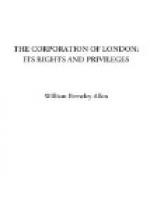Aldermen and Common-Councilmen.
The contemplated reduction of the governing body of the City is based upon a specious theory, which will soon be found to be utterly untenable. It is pretended that if the Courts of Aldermen and of Common Council were rendered more exclusive, it would be considered a greater distinction to belong to them, and that consequently a more wealthy and influential class of individuals would seek to be elected. In the first place, the exclusiveness sought to be established in the Corporation of London is the very blot which the Municipal Act was intended to remove from other corporate bodies. What was in them a blemish, is to be engrafted as a beauty into the City of London. But granting that a certain degree of exclusiveness may be not only unobjectionable, but even desirable, is it so very certain that opulent bankers and men of high standing in the commercial world will be thereby induced to offer themselves as candidates for civic offices? Have they themselves offered any suggestion to this effect, or asked for any such motive to do their duty as free-born citizens? Nothing of the kind. It is pure assumption to assert that when the honour is more difficult of attainment it will become an object of ambition to the mighty men on ’Change. The witnesses who gave evidence on this head before the commissioners were unanimous as to the cause that keeps our princely merchants aloof from the civic arena: it is want of time. One and all declared that they could not spare the time from their own pursuits and engagements. Private interests have more weight with them than those of a public nature; they wish no harm to their fellow-citizens, but will not sacrifice their own comfort or profits to toil for their benefit. Indeed, it is by no means manifest that bankers and merchants are the fittest persons to administer the affairs of the City. As a rule, their homes are as remote as possible from the scene of their daily labours. They know nothing whatever of their neighbours, and care no more for one ward than for another, all being equally indifferent to them. They are bound together by no common ties, nor have they any local or traditional sympathies. It is, therefore, very doubtful that their presence among the aldermen, or in the Court of Common Council, would prove at all beneficial to the City, or likely to enhance their own personal reputation. And if, as they themselves allege, they have hitherto been deterred from undertaking




